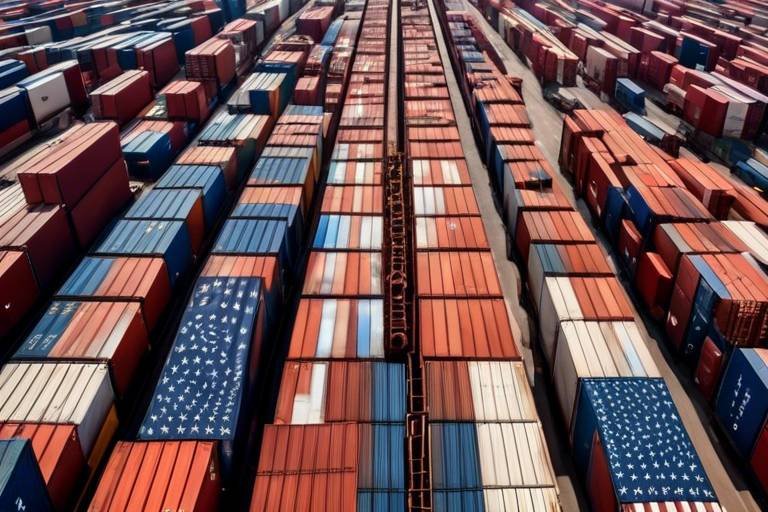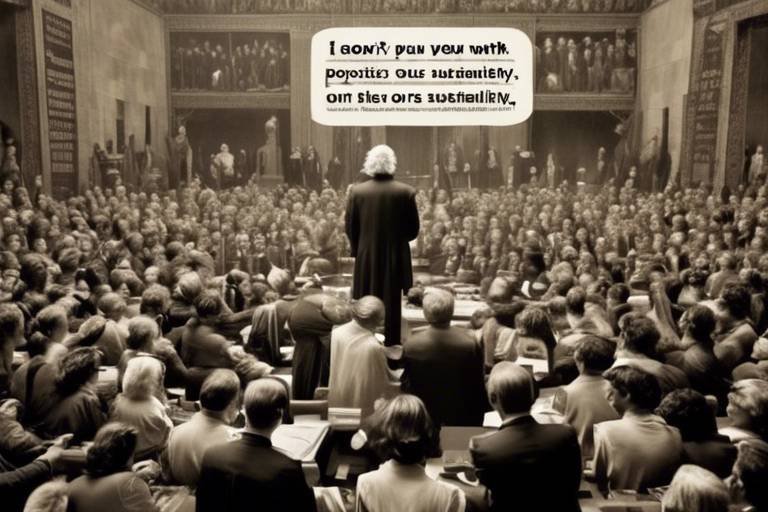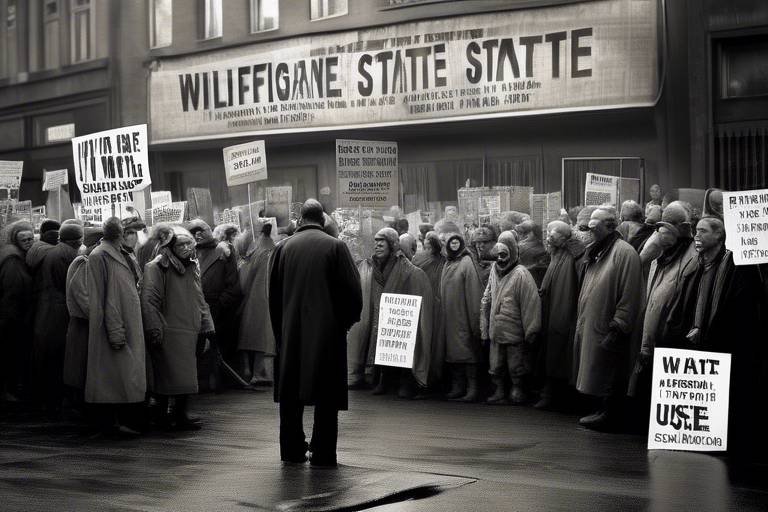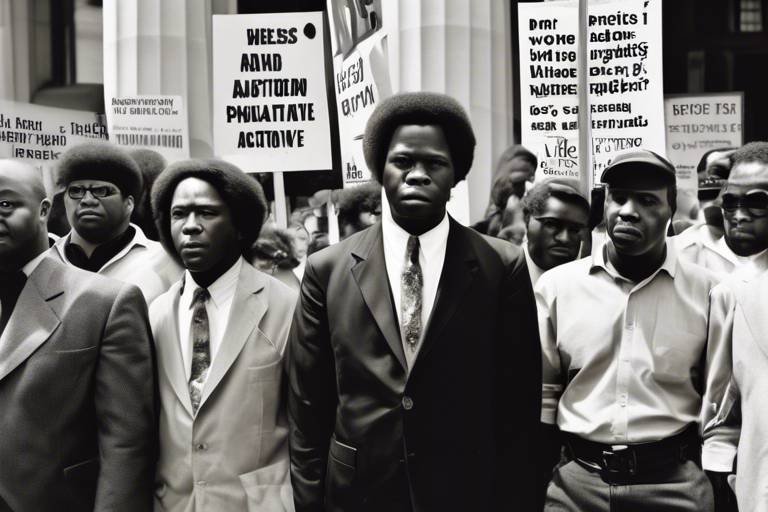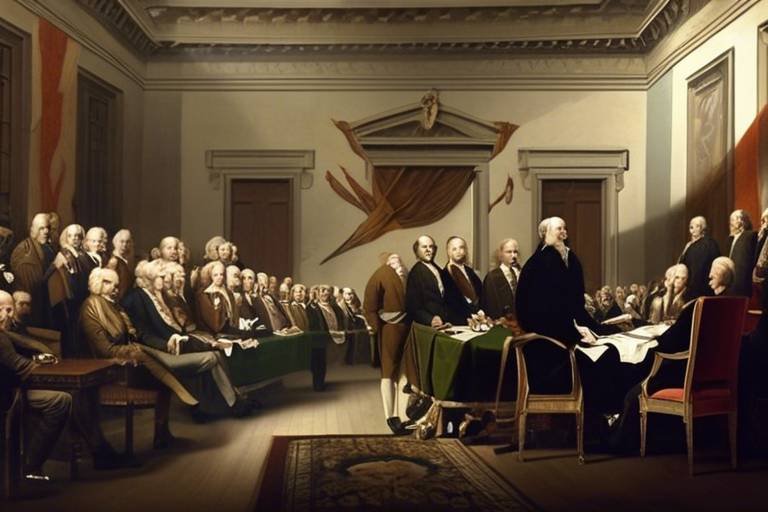The Philosophy behind the Politics of Trade Wars
Trade wars are not just economic skirmishes; they are the manifestation of deeper philosophical beliefs and political ideologies. At their core, these conflicts represent a clash of values, priorities, and strategies that nations adopt in the global marketplace. When countries impose tariffs or trade restrictions, they are often guided by a mix of economic theories, political motivations, and ethical considerations. Understanding the philosophy behind these actions helps us grasp why nations behave the way they do in the face of global trade challenges.
To illustrate this, consider the metaphor of a chess game. Each move made by a player is not just about the immediate gain but also about anticipating the opponent's reactions and the long-term implications of those moves. Similarly, in trade wars, countries must think strategically about how their actions will affect not only their economic standing but also their relationships with other nations. The philosophy behind these decisions can be complex, intertwining various schools of thought that shape economic policies and international relations.
Moreover, the implications of trade wars extend far beyond mere economic metrics. They can lead to shifts in global power dynamics, influence national security, and even affect cultural exchanges between nations. As countries navigate the turbulent waters of trade, they must balance their own interests with the potential repercussions on global stability. This delicate balance is where the philosophy of trade wars truly comes into play, revealing the intricate web of motivations that drive nations to engage in such contentious practices.
In essence, the philosophy behind the politics of trade wars is a reflection of a nation's identity and aspirations. It is about more than just dollars and cents; it encompasses a broader narrative about how countries wish to position themselves in the world. As we delve deeper into this topic, we will explore the various economic theories, political ideologies, and ethical considerations that shape trade wars, providing a comprehensive understanding of this complex phenomenon.
- What are trade wars? Trade wars occur when countries impose tariffs or restrictions on each other's goods, often leading to retaliatory measures.
- What are the main causes of trade wars? Causes can include economic protectionism, political pressures, and national security concerns.
- How do trade wars affect global economies? Trade wars can lead to increased prices for consumers, disrupted supply chains, and strained international relationships.
- What is the role of tariffs in trade wars? Tariffs are taxes imposed on imported goods, used to protect domestic industries but can lead to retaliatory actions from trading partners.

Understanding Trade Wars
Trade wars are like a high-stakes chess game played on the global stage, where countries impose tariffs and restrictions on each other's goods. At their core, these conflicts arise from a mixture of economic, political, and social factors that can turn friendly trade relationships into battlegrounds. But what exactly triggers a trade war? Often, it’s a response to perceived unfair trade practices, such as dumping (selling goods at artificially low prices) or currency manipulation. Countries feel the need to protect their domestic industries and jobs, leading them to retaliate against what they see as aggressive tactics by their trading partners.
The implications of trade wars are far-reaching. Economically, they can lead to increased prices for consumers, reduced choices in the marketplace, and strained international relations. Imagine walking into your favorite store only to find that the prices have skyrocketed overnight because of tariffs. It’s not just a personal inconvenience; it reflects a larger economic trend where the cost of goods rises due to the added financial burdens imposed by governments. This scenario can create a ripple effect, impacting not only consumers but also businesses that rely on imported materials.
Moreover, trade wars can have significant geopolitical consequences. They may lead to a breakdown in diplomatic relations, as countries become locked in a cycle of retaliation. For instance, when one nation raises tariffs, the affected country often responds in kind, leading to a tit-for-tat scenario that can escalate quickly. This can create a tense atmosphere that complicates negotiations on other important issues, such as climate change or security agreements.
In the grand scheme of things, trade wars symbolize more than just economic disputes; they reflect deeper ideological battles over globalization and national identity. Countries caught in a trade war often grapple with the balance between protecting their own interests and engaging in the global marketplace. It raises questions like: Should we prioritize domestic growth at the expense of international cooperation? Or is it possible to forge a path that benefits all parties involved?
To better understand the complexities of trade wars, let’s break down some of the key elements:
- Tariffs: Taxes imposed on imported goods, making them more expensive and less competitive compared to domestic products.
- Quotas: Limits on the quantity of goods that can be imported, directly affecting supply and demand.
- Retaliation: Countries often respond to tariffs with their own, creating a cycle of escalating trade barriers.
Ultimately, trade wars serve as a reminder that the global economy is intricately connected. The decisions made by one country can reverberate across borders, affecting millions of lives. Understanding trade wars is crucial for grasping the broader dynamics of international relations and economics, as they encapsulate the ongoing struggle between protectionism and free trade.

The Economic Theories at Play
When it comes to understanding trade wars, it’s essential to recognize the various economic theories that provide the backbone for the decisions made by policymakers. These theories help to frame the rationale behind imposing tariffs and trade barriers, and they can vary significantly from one perspective to another. In this section, we will delve into three primary economic perspectives: classical economics, Keynesian economics, and protectionism. Each of these theories offers unique insights into why nations engage in trade wars and how they justify their actions on the global stage.
Classical economics, rooted in the works of thinkers like Adam Smith and David Ricardo, champions the idea of free trade. Proponents argue that when countries engage in open trade, it leads to enhanced efficiency, greater consumer choice, and overall economic growth. According to classical economists, trade wars are seen as detrimental not just to the countries involved but also to the global economy as a whole. They believe that imposing tariffs disrupts the natural flow of trade, leading to inefficiencies and a misallocation of resources.
One of the cornerstones of classical economic theory is David Ricardo's principle of comparative advantage. This principle suggests that nations should specialize in producing goods in which they have a relative efficiency advantage. For example, if Country A can produce wine more efficiently than wheat, while Country B can produce wheat more efficiently than wine, both countries benefit by specializing and trading. However, trade wars disrupt this delicate balance. When tariffs are imposed, countries may find themselves producing goods that they are less efficient at making, leading to a decrease in overall economic welfare.
Adam Smith introduced the concept of the "invisible hand," which posits that individuals pursuing their self-interest can lead to positive economic outcomes for society as a whole. This idea hinges on the belief that free markets naturally regulate themselves through competition and consumer choice. When trade wars occur, this invisible hand is stifled. Tariffs and trade barriers can distort market dynamics, leading to increased prices for consumers and reduced competition. As a result, the very benefits that free trade promotes—such as innovation, efficiency, and consumer welfare—are compromised.
On the other end of the spectrum, Keynesian economics presents a different viewpoint. Rooted in the ideas of John Maynard Keynes, this perspective emphasizes the role of government intervention in stabilizing economies, especially during downturns. Keynesian theorists might argue that trade wars can be justified as a protective measure for domestic industries. During economic slumps, protecting local jobs through tariffs can be seen as a necessary evil to maintain economic stability. However, this approach can lead to a cycle of retaliation, where countries impose their tariffs in response, further escalating the trade war.
In summary, the economic theories at play during trade wars reveal a complex landscape where different ideologies clash. While classical economics advocates for free trade and efficiency, Keynesian perspectives may support protectionist measures during economic crises. Understanding these theories is crucial for grasping the motivations behind trade policies and their implications for global economics.
- What are trade wars? Trade wars occur when countries impose tariffs or restrictions on each other's goods, often as a means to protect domestic industries.
- How do tariffs affect consumers? Tariffs typically lead to higher prices for imported goods, which can reduce consumer choice and overall welfare.
- What is comparative advantage? Comparative advantage is an economic principle that suggests countries should specialize in producing goods they can create most efficiently.
- Why do governments engage in trade wars? Governments may engage in trade wars to protect domestic industries, respond to unfair trade practices, or pursue nationalistic agendas.

Classical Economic Perspectives
When we talk about classical economic perspectives, we're diving into a world where the mantra is clear: free trade is the way to go! Classical economists, like Adam Smith and David Ricardo, champion the idea that open markets not only foster competition but also enhance efficiency and consumer choice. Imagine a bustling marketplace where every vendor offers their best products, each competing for your attention. This vibrant environment leads to lower prices and higher quality goods—something we all appreciate, right?
However, trade wars throw a wrench into this harmonious system. By imposing tariffs and trade barriers, countries disrupt the delicate balance that classical economists argue is essential for economic growth. It's like throwing a boulder into that bustling marketplace; suddenly, vendors are limited in what they can sell and how they can compete. The result? Higher prices and less choice for consumers, which classical economists view as a significant setback for international cooperation and economic prosperity.
One of the cornerstones of classical economics is David Ricardo's theory of comparative advantage. This theory posits that nations should specialize in producing goods they can create most efficiently, then trade with others to get what they need. For instance, if Country A is great at making wine while Country B excels at producing cheese, both countries can benefit by focusing on their strengths and trading with each other. However, when trade wars erupt, this principle gets disrupted. Countries may find themselves hoarding resources or imposing tariffs that make it more expensive to trade, leading to inefficiencies that hurt everyone involved.
Additionally, we can't overlook Adam Smith's concept of the invisible hand. This metaphor suggests that individuals seeking their self-interest inadvertently contribute to the overall good of society. In a free market, when businesses strive to maximize profits, they end up providing better products and services to consumers. But in the context of trade wars, the invisible hand gets stifled. Tariffs and restrictions distort market signals, leading to misallocation of resources and ultimately harming consumer welfare. It's like trying to navigate a maze where the walls keep shifting—confusing and frustrating for everyone trying to find their way!
In summary, classical economic perspectives advocate for a world where trade flows freely, benefiting consumers and producers alike. Trade wars, however, introduce complications that undermine these principles, leading to inefficiencies and a less prosperous global economy. As we navigate the complexities of modern trade, it's essential to remember the lessons from classical economics and strive for a system that promotes cooperation rather than conflict.
- What is a trade war? A trade war occurs when countries impose tariffs or restrictions on each other's goods, leading to escalating tensions and economic consequences.
- How do classical economists view trade wars? Classical economists believe that trade wars are detrimental to economic growth, as they disrupt the benefits of free trade and comparative advantage.
- What is comparative advantage? Comparative advantage is an economic principle stating that countries should specialize in producing goods they can create most efficiently and trade with others.
- What is the invisible hand? The invisible hand is a metaphor introduced by Adam Smith, suggesting that individuals seeking their self-interest can inadvertently benefit society as a whole through free market dynamics.

David Ricardo's Comparative Advantage
David Ricardo's theory of comparative advantage is a cornerstone of classical economics and provides a compelling argument for the benefits of free trade. At its core, this theory posits that even if a country is less efficient in producing all goods compared to another country, it can still benefit from trade by specializing in the production of goods in which it has a relative efficiency advantage. This means that nations should focus on producing what they can create most efficiently while trading for other goods that are more efficiently produced by others. The beauty of this concept lies in its potential to enhance overall economic welfare and productivity on a global scale.
However, trade wars disrupt this fundamental principle. When countries impose tariffs or trade restrictions, they create barriers that inhibit the natural flow of goods and services based on comparative advantages. For instance, if Country A is highly efficient in producing wine but less so in manufacturing cars, while Country B is the opposite, a trade war could lead to both countries attempting to produce both goods independently. This not only reduces overall efficiency but also leads to higher prices for consumers. Imagine trying to bake a cake without the right ingredients; the result is often a less satisfying product. Similarly, trade wars lead to suboptimal outcomes in the global marketplace.
To illustrate the impact of comparative advantage, consider the following hypothetical scenario:
| Country | Product A (Wheat) | Product B (Clothes) |
|---|---|---|
| Country X | 10 units | 5 units |
| Country Y | 4 units | 8 units |
In this example, Country X has a comparative advantage in producing wheat, while Country Y excels in producing clothes. If both countries engage in trade, they can maximize their production capabilities and enjoy a greater variety of goods at lower prices. However, if a trade war erupts and tariffs are imposed on imported goods, both countries may end up producing both products domestically, leading to inefficiencies and higher costs for consumers.
Ultimately, Ricardo's comparative advantage underscores the importance of international cooperation in fostering economic growth and stability. Trade wars not only undermine this principle but also strain diplomatic relations. The ripple effects can be felt across the globe, affecting everything from consumer prices to job markets. As nations grapple with the complexities of trade policies, it is essential to remember the lessons of comparative advantage and the potential benefits of free trade, which can lead to a more prosperous global economy.
- What is comparative advantage? Comparative advantage is an economic theory that suggests that countries should specialize in producing goods they can create most efficiently and trade for others, leading to improved overall economic welfare.
- How do trade wars affect comparative advantage? Trade wars disrupt the natural flow of goods based on comparative advantage, leading to inefficiencies, higher prices, and reduced economic growth.
- Why is international cooperation important? International cooperation enhances economic growth, stability, and consumer welfare by allowing countries to benefit from each other's strengths through trade.

Adam Smith's Invisible Hand
Adam Smith, often heralded as the father of modern economics, introduced the concept of the invisible hand in his seminal work, "The Wealth of Nations." This metaphor describes the self-regulating nature of a free market, where individuals pursuing their own interests inadvertently contribute to the overall good of society. In essence, when businesses compete to offer the best products at the lowest prices, they not only enhance consumer choice but also stimulate economic growth. However, when trade wars erupt, this harmonious mechanism is thrown into disarray.
Trade wars, characterized by the imposition of tariffs and trade barriers, distort the natural flow of goods and services. Instead of allowing the invisible hand to guide market dynamics, these conflicts create artificial obstacles that hinder competition and innovation. For instance, when a country raises tariffs on imported goods, it may temporarily protect domestic industries, but it also leads to higher prices for consumers. This situation can be likened to a garden choked by weeds; while some plants may thrive, the overall ecosystem suffers. The invisible hand, which relies on free exchange and cooperation, is stifled, resulting in inefficiencies that can ripple through the global economy.
Moreover, the implications of trade wars extend beyond just economic metrics. They can lead to a reduction in consumer welfare as people face limited choices and higher costs. Imagine walking into a store where the shelves are half-empty because tariffs have made imports prohibitively expensive. This scenario is not just an inconvenience; it represents a failure of the market system that Smith envisioned, where the invisible hand should ideally ensure that supply meets demand efficiently.
In the grand scheme of things, the invisible hand operates best in an environment of cooperation rather than conflict. When nations engage in trade wars, they not only disrupt their own economies but also jeopardize international relationships. The resulting uncertainty can deter investment and stifle economic collaboration, ultimately leading to a more fragmented global market. As we consider the broader implications of trade wars, it's essential to recognize that the invisible hand thrives on the principles of trust and mutual benefit.
In conclusion, while trade wars may be justified by short-term political gains or nationalistic sentiments, they undermine the foundational principles that Adam Smith championed. The invisible hand is a powerful force that, when left to operate freely, can lead to prosperity and innovation. However, when obstructed by tariffs and trade restrictions, it reveals the fragility of our interconnected economies and the potential for long-lasting damage. As we navigate the complexities of global trade, it's crucial to remember that the invisible hand works best when we embrace collaboration over confrontation.

Keynesian Economic Views
When we dive into the world of Keynesian economics, we find a perspective that significantly diverges from classical theories. Keynesians argue that the economy does not always self-correct; instead, it can be prone to cycles of boom and bust. This perspective leads to the idea that governments should intervene during economic downturns to stabilize the economy. So, how does this relate to trade wars? Well, Keynesian theorists might justify trade wars as a protective measure for domestic industries when the economy is struggling. They believe that by imposing tariffs and restrictions, countries can shield their local businesses from foreign competition, allowing them to recover and thrive.
Consider this: when a nation faces high unemployment and sluggish growth, the instinct might be to protect local jobs. The imposition of tariffs can be seen as a way to boost domestic demand for local products, thus stimulating the economy. However, this protectionist approach can lead to a retaliatory cycle, where trading partners respond with their own tariffs, further escalating the trade war. This back-and-forth can create a situation where everyone loses, yet the Keynesian view suggests that short-term sacrifices might be necessary for long-term stability.
Moreover, Keynesians emphasize the importance of consumer confidence and spending. They argue that when consumers perceive their jobs as threatened by foreign competition, their willingness to spend diminishes. This leads to a vicious cycle where reduced consumer spending exacerbates economic downturns. Therefore, trade wars, while intended to protect jobs, can ironically lead to greater economic instability. The paradox of protectionism in a globalized economy is a critical point of contention among economists.
To illustrate this further, let’s look at a simplified table that outlines the potential short-term and long-term effects of trade wars from a Keynesian perspective:
| Effects | Short-Term Impact | Long-Term Impact |
|---|---|---|
| Consumer Prices | Increase due to tariffs | Potential decrease as markets adjust |
| Domestic Employment | Temporary protection for some jobs | Job losses in export sectors |
| Economic Growth | Stimulation in certain sectors | Overall reduction in growth due to inefficiencies |
| International Relations | Tension and conflict | Long-term damage to trade partnerships |
In conclusion, while the Keynesian viewpoint may advocate for temporary protective measures during economic crises, it also warns of the potential pitfalls of trade wars. These conflicts can disrupt not only the targeted economies but also the delicate balance of international trade relationships. As nations grapple with these complex dynamics, the challenge lies in finding a middle ground that promotes both domestic stability and global cooperation.
- What is the main idea behind Keynesian economics? Keynesian economics emphasizes the role of government intervention in stabilizing the economy during downturns.
- How do trade wars affect consumer prices? Trade wars typically lead to higher consumer prices due to tariffs imposed on imported goods.
- Can trade wars lead to job losses? Yes, while they may protect some jobs in the short term, trade wars can result in job losses in export sectors over the long term.
- What are the long-term effects of trade wars on economic growth? Trade wars can lead to inefficiencies in the market, ultimately hindering overall economic growth.

Political Ideologies and Trade Wars
When we think about trade wars, it’s essential to recognize that they often stem from deeper political ideologies. These ideologies shape how countries view their place in the global market and influence their decisions regarding tariffs and trade restrictions. At the heart of this issue are three predominant ideologies: nationalism, liberalism, and socialism. Each of these perspectives offers a unique lens through which to analyze the motivations behind trade wars and their implications for international relations.
Nationalism, for instance, tends to prioritize the interests of a nation’s own economy above all else. When a country adopts a nationalist approach, it often leads to protectionist policies aimed at shielding domestic industries from foreign competition. This can create a ripple effect, escalating conflicts between nations as they retaliate against each other’s tariffs. The emotional appeal of nationalism can be powerful, as it taps into a sense of pride and identity, making it a potent force in shaping trade policies. As countries become more insular, the potential for cooperation diminishes, leading to a more fractured global economy.
On the other hand, liberalism advocates for free trade and open markets, positing that such practices lead to mutual benefits for all parties involved. From this viewpoint, trade wars are seen as counterproductive, disrupting the flow of goods and services that can enhance economic growth. Liberal ideologies emphasize the importance of international cooperation, suggesting that nations should work together to address shared challenges rather than resorting to protectionist measures. This perspective aligns with classical economic theories that champion the idea of comparative advantage, where countries can gain from specializing in what they do best.
Socialism introduces yet another dimension to the discussion of trade wars. This ideology often emphasizes equity and social justice, advocating for policies that protect workers and promote fair labor standards. In this context, trade wars may be justified as a means to defend domestic jobs against the pressures of globalization. Socialists may argue that free trade can lead to exploitation and inequality, and thus, imposing tariffs can be a tool for protecting vulnerable populations. However, this approach can also lead to tensions with nations that prioritize free market principles, further complicating international relations.
To illustrate how these ideologies interact with trade policies, consider the following table that summarizes their key characteristics:
| Ideology | Key Characteristics | Impact on Trade Wars |
|---|---|---|
| Nationalism | Focus on domestic interests, protectionist policies | Leads to escalation of trade conflicts |
| Liberalism | Advocates for free trade and international cooperation | Opposes trade wars as detrimental to global economy |
| Socialism | Emphasis on equity, protection of workers' rights | Justifies tariffs to protect domestic jobs |
The interplay between these political ideologies not only shapes the decisions made by governments but also influences public opinion. As citizens become more aware of the implications of trade wars, they may align themselves with one ideology over another, which can further affect policymaking. Ultimately, the political landscape surrounding trade is complex and multifaceted, with each ideology offering distinct insights into the motivations and consequences of trade wars.

The Role of Nationalism
Nationalism plays a pivotal role in shaping trade policies, often acting as a driving force behind protectionist measures and trade wars. When countries prioritize their own economic interests, they frequently resort to tariffs and quotas, aiming to shield domestic industries from foreign competition. This phenomenon can be likened to a protective parent, who, in an effort to ensure their child's safety, may inadvertently stifle their growth and independence. Nationalist sentiments can escalate conflicts between nations, creating a hostile environment that undermines international cooperation and trade.
The rise of nationalism is often fueled by economic anxieties and cultural concerns. In times of economic uncertainty, citizens may feel threatened by global competition, leading to a surge in nationalist rhetoric. Politicians harness these sentiments, promising to protect jobs and industries by adopting a more aggressive stance on trade. This can create a cycle where the fear of losing jobs to foreign entities fosters further protectionist policies, which in turn can lead to retaliatory measures from other countries.
As nations engage in this tit-for-tat approach, the implications for global trade dynamics become increasingly complex. For instance, when one country imposes tariffs, it may lead others to do the same, resulting in a downward spiral of economic retaliation. This scenario not only disrupts established trade relationships but also creates uncertainty in global markets, affecting businesses and consumers alike. Ultimately, the consequences of nationalism in trade wars can be far-reaching, impacting everything from supply chains to consumer prices.
Moreover, the role of nationalism extends beyond mere economic considerations; it intertwines with issues of identity and sovereignty. Countries may view trade wars as a way to assert their independence and reclaim control over their economies. This can lead to a sense of unity among citizens, who rally around the idea of protecting their nation from perceived external threats. However, this nationalism can also foster hostility towards other nations, complicating diplomatic relations and leading to a fragmented global landscape.
In summary, nationalism significantly influences trade policies and the dynamics of trade wars. While it may serve as a rallying point for domestic industries, it often comes at the cost of international cooperation and economic stability. As countries navigate the complex interplay of nationalism and trade, the challenge lies in balancing national interests with the need for global collaboration.
- What is nationalism in the context of trade? Nationalism in trade refers to prioritizing domestic industries and economic interests over international cooperation, often leading to protectionist measures.
- How do trade wars impact global economies? Trade wars can disrupt supply chains, increase consumer prices, and create uncertainty in global markets, negatively affecting economies worldwide.
- Can nationalism lead to positive outcomes in trade? While nationalism can protect certain domestic industries, it often leads to retaliatory measures that can harm broader economic relationships and stability.
- What role do politicians play in fostering nationalism? Politicians often leverage nationalist sentiments during economic downturns to gain support for protectionist policies, appealing to citizens' fears of global competition.

Globalization vs. Protectionism
The tug-of-war between globalization and protectionism is one of the most compelling narratives in the realm of international trade. On one side, globalization champions the idea of interconnected economies, where countries benefit from free trade, shared resources, and cultural exchanges. It promotes the notion that when nations collaborate, they can achieve greater economic growth, drive innovation, and enhance consumer choice. Think of globalization as a vast ocean where every country is a boat, sailing toward prosperity through trade winds.
In contrast, protectionism emerges as a defensive strategy, advocating for policies that shield domestic industries from foreign competition. This approach often manifests through tariffs, import quotas, and other trade barriers, creating a fortress around national economies. Imagine a country as a garden, where the government plants walls to protect local flowers from invasive weeds. While this can help nurture local businesses and preserve jobs, it often leads to a stunted growth environment, where innovation is limited and consumers face higher prices.
The clash between these two ideologies raises crucial questions: Is it better to open the gates for global trade, or to safeguard local interests? The answer is rarely black and white. On one hand, proponents of globalization argue that it fosters competition, driving down prices and improving quality. They point to the rise of multinational corporations and the incredible variety of goods available to consumers as evidence of globalization's success. On the other hand, protectionists highlight the risks of dependency on foreign markets and the potential loss of jobs when industries cannot compete effectively.
To illustrate this further, consider the following table that summarizes the key differences between globalization and protectionism:
| Aspect | Globalization | Protectionism |
|---|---|---|
| Definition | Integration of economies through free trade | Imposing tariffs and restrictions to protect local industries |
| Impact on Prices | Tends to lower prices | Tends to raise prices |
| Consumer Choice | Increases variety of goods | Limits variety to domestic products |
| Economic Growth | Promotes growth through competition | Can hinder growth by limiting market access |
As we navigate these waters, it becomes evident that the balance between globalization and protectionism is crucial for sustainable economic development. Countries must weigh the benefits of open markets against the need to protect their industries and workforce. This balancing act is akin to walking a tightrope; too much weight on either side can lead to a fall, affecting not just the economy but also the social fabric of nations.
In conclusion, the debate between globalization and protectionism is not merely an economic discourse; it reflects deeper values and priorities of societies. As nations continue to grapple with these issues, the outcomes will shape the landscape of international trade for generations to come. Will we embrace the openness of globalization, or will we retreat into the safety of protectionism? The answer lies in the choices we make today.
- What is globalization? Globalization refers to the process of increased interconnectedness and interdependence among countries, often through trade, investment, and cultural exchange.
- What is protectionism? Protectionism is an economic policy that seeks to protect domestic industries from foreign competition by imposing tariffs, quotas, and other restrictions on imports.
- How do trade wars relate to globalization and protectionism? Trade wars often arise from protectionist policies that countries adopt in response to perceived threats from globalization, leading to tariffs and restrictions on trade.
- Can countries benefit from both globalization and protectionism? Yes, many countries strive to find a balance, leveraging the benefits of globalization while implementing protectionist measures to safeguard key industries.

Ethical Considerations in Trade Wars
When we think about trade wars, it’s easy to get lost in the numbers and statistics. However, beneath the surface of tariffs and trade barriers lies a complex web of ethical considerations that can shape public opinion and policy decisions. These ethical dilemmas often revolve around fundamental questions of justice, equity, and human rights. As nations engage in trade wars, they must grapple with the moral implications of their actions, particularly when these actions have far-reaching consequences for people and the planet.
One of the most pressing ethical issues in trade wars is the impact on human rights and labor standards. When countries impose tariffs, they often do so to protect domestic industries, but this can come at a significant cost to workers in other nations. For instance, if a country raises tariffs on imported goods, it may lead to job losses in countries that rely heavily on exports. This raises a critical question: At what point does the pursuit of national interests compromise our commitment to global human rights? Many argue that imposing tariffs without considering their impact on vulnerable populations is fundamentally unjust.
Moreover, trade wars can exacerbate existing inequalities. Wealthier nations may have the resources to weather the storm of tariffs, while developing countries may suffer disproportionately. This imbalance can lead to a cycle of poverty and exploitation, where the most marginalized are left to bear the brunt of economic conflicts. The ethical implications here are profound: Should nations prioritize their economic interests at the expense of global equity? Or should they strive for a more balanced approach that considers the welfare of all people, regardless of borders?
Another critical ethical consideration is the environmental impact of trade wars. As nations impose tariffs, they may inadvertently encourage environmentally harmful practices. For example, if tariffs lead to a decrease in imports of environmentally friendly products, countries might turn to less sustainable alternatives. This situation poses a moral dilemma: Do we prioritize short-term economic gains over long-term environmental sustainability? The ethical responsibility of nations extends beyond their borders, and trade policies should reflect a commitment to protecting the planet for future generations.
In light of these ethical considerations, it’s essential for policymakers to engage in a broader dialogue about the implications of their decisions. This dialogue should include a diverse range of voices, particularly those from communities that are often marginalized in these discussions. By fostering inclusive conversations, nations can work towards trade policies that prioritize not only economic growth but also social justice and environmental stewardship.
In conclusion, the ethical considerations surrounding trade wars are complex and multifaceted. As countries navigate these turbulent waters, they must weigh their national interests against their global responsibilities. The choices made today will shape the future of international relations and the well-being of people and the planet alike.
- What are the primary ethical concerns in trade wars?
Trade wars raise issues related to human rights, labor standards, and environmental impacts. Countries must consider how their trade policies affect vulnerable populations and the planet. - How do trade wars impact developing countries?
Developing countries often suffer disproportionately from trade wars, facing job losses and economic instability as wealthier nations impose tariffs. - Can trade policies reflect ethical considerations?
Yes, trade policies can and should reflect ethical considerations by prioritizing social justice and environmental sustainability alongside economic interests.

Human Rights and Labor Standards
When we talk about trade wars, it’s hard to ignore the ripple effects they have on human rights and labor standards. Imagine a world where countries are at each other's throats over tariffs and trade restrictions. While this might seem like a distant political battle, the consequences are felt right down to the factories and farms where people work. Trade policies often reflect the ethical landscape of a nation, and when tariffs are imposed, they can lead to a domino effect that impacts workers' rights and living conditions globally.
At the heart of this issue is the question: What happens to the workers? When countries prioritize protectionist policies, they may inadvertently support industries that engage in unethical labor practices. For instance, if a nation imposes tariffs on imported goods to protect its local manufacturing sector, it might also turn a blind eye to the labor conditions that workers endure in those industries. This can lead to a situation where exploitation becomes the norm, particularly in developing countries where labor laws may be less stringent.
Moreover, trade wars can exacerbate existing inequalities. Countries often leverage tariffs to gain a competitive edge, but this can come at the cost of workers' rights. When companies face increased costs due to tariffs, they might resort to cutting corners, which can lead to:
- Lower wages
- Increased working hours
- Unsafe working conditions
These factors create a vicious cycle where the very people that trade policies are supposed to protect are left vulnerable. It's essential to consider how trade agreements and tariffs can either uphold or undermine ethical labor practices. For instance, some nations have begun to tie trade agreements to labor standards, ensuring that countries uphold certain rights in exchange for trade benefits. This approach can help mitigate the negative impacts of trade wars on workers.
Furthermore, the global nature of supply chains complicates the situation. A product might be designed in one country, manufactured in another, and sold in yet another, making it difficult to trace the ethical implications of labor practices through the entire chain. This interconnectedness means that a trade war initiated in one region can have far-reaching effects, impacting labor standards across multiple nations.
In conclusion, as we navigate the complexities of trade wars, it's crucial to keep a keen eye on human rights and labor standards. Trade policies should not only aim for economic benefits but also prioritize the dignity and rights of workers worldwide. Addressing these ethical concerns is not just a matter of policy; it’s about ensuring justice and equity in a globalized economy.
- What are trade wars? Trade wars occur when countries impose tariffs or restrictions on each other's goods, often leading to retaliatory measures and escalating tensions.
- How do trade wars affect human rights? Trade wars can lead to exploitation and poor labor conditions, particularly in countries with weaker labor laws, as companies might cut costs to remain competitive.
- Can trade agreements improve labor standards? Yes, some trade agreements include clauses that require nations to uphold certain labor standards, helping to protect workers' rights.
- What is the relationship between trade wars and globalization? Trade wars often arise from a backlash against globalization, as countries seek to protect domestic industries from foreign competition.

Environmental Impact
The environmental implications of trade wars are significant and multifaceted, often extending far beyond the immediate economic repercussions. When countries engage in trade wars, they frequently impose tariffs and quotas on imported goods, which can lead to a range of environmental outcomes. For instance, the push for domestic production as a result of protective tariffs can lead to increased local manufacturing. While this might seem beneficial for job creation, it can also result in heightened pollution levels, as industries may not adhere to the same environmental standards as their international counterparts.
Moreover, trade wars can disrupt established supply chains, forcing countries to seek alternative sources for raw materials and products. This scramble for new suppliers can lead to environmental degradation, particularly in regions where regulations are lax. The extraction of natural resources may escalate, resulting in deforestation, loss of biodiversity, and increased carbon emissions. For example, if a country imposes tariffs on steel imports, it might ramp up domestic steel production, which is often energy-intensive and environmentally damaging.
On a broader scale, the environmental impact of trade wars can be analyzed through the lens of global cooperation. Trade agreements often include environmental provisions aimed at promoting sustainable practices. However, when nations turn to protectionism, they may abandon these agreements, leading to a race to the bottom in terms of environmental standards. The following table illustrates some of the potential environmental impacts of trade wars:
| Impact | Description |
|---|---|
| Increased Pollution | Domestic industries may pollute more if environmental regulations are weaker. |
| Resource Depletion | Heightened demand for local raw materials can lead to over-extraction. |
| Biodiversity Loss | Expansion of industries can encroach on natural habitats, threatening wildlife. |
| Carbon Emissions | Shifts in production locations can increase overall carbon footprints. |
It's essential to consider the ethical responsibilities of nations in the context of global trade. As countries grapple with the consequences of their trade policies, they must also confront the moral implications of their actions. Questions arise about how trade wars affect not only the economy but also the planet. Are nations prioritizing short-term economic gains over long-term sustainability? Are they willing to sacrifice environmental health for the sake of protecting domestic industries? These are crucial questions that policymakers must grapple with as they navigate the complex landscape of international trade.
In conclusion, the environmental impact of trade wars serves as a stark reminder of the interconnectedness of global economies and ecosystems. As nations engage in these conflicts, they must remain vigilant about the broader implications of their policies. The choices made today will undoubtedly shape the environmental landscape for generations to come, emphasizing the need for a balanced approach that considers both economic and ecological well-being.
- What are trade wars? Trade wars occur when countries impose tariffs or restrictions on each other’s goods to protect their domestic industries.
- How do trade wars affect the environment? Trade wars can lead to increased pollution and resource depletion, as countries may ramp up domestic production without stringent environmental regulations.
- What is the role of globalization in trade wars? Globalization promotes interconnectedness in trade, while trade wars often push countries toward protectionism, creating tension between the two concepts.
- Can trade wars impact global cooperation on environmental issues? Yes, trade wars can undermine international agreements aimed at promoting sustainable practices, leading to a decline in global environmental standards.
Frequently Asked Questions
- What is a trade war?
A trade war occurs when countries impose tariffs or restrictions on each other's goods. It's like a tit-for-tat game where nations try to protect their own industries, but it often leads to increased prices and strained relationships.
- What are the main causes of trade wars?
Trade wars can be triggered by various factors, including economic imbalances, protectionist policies, and political pressures. Countries may feel the need to defend their domestic industries from foreign competition, which can escalate tensions and lead to retaliatory measures.
- How do economic theories influence trade wars?
Economic theories like classical, Keynesian, and protectionist perspectives shape how nations approach trade wars. For instance, classical economists argue that free trade benefits everyone, while Keynesians may support tariffs to protect jobs during economic downturns.
- What is the role of nationalism in trade wars?
Nationalism can fuel protectionist policies, leading countries to prioritize their own industries over international cooperation. This often results in trade wars as nations seek to assert their dominance and protect local jobs.
- How do trade wars impact global trade dynamics?
Trade wars can disrupt global supply chains, increase prices for consumers, and create uncertainty in international markets. They can also lead to shifts in alliances and trade partnerships as countries navigate the complexities of tariffs and restrictions.
- What are the ethical implications of trade wars?
Trade wars raise important ethical questions, particularly regarding human rights and labor standards. Tariffs can affect workers in various countries, and the moral responsibility of nations in enforcing fair labor practices comes into play.
- Can trade wars affect the environment?
Absolutely! Trade policies can either worsen or improve environmental conditions. For example, tariffs on environmentally harmful goods might encourage better practices, while protectionist measures could lead to increased pollution if countries prioritize local production over sustainable practices.
- What is the impact of tariffs on consumers?
Tariffs generally lead to higher prices for consumers. When countries impose tariffs, businesses often pass those costs onto customers, resulting in increased prices for imported goods and potentially reducing consumer choice.
- How can countries resolve trade disputes?
Countries can resolve trade disputes through negotiations, international trade agreements, and organizations like the World Trade Organization (WTO). Open dialogue and compromise are essential for reducing tensions and finding mutually beneficial solutions.

